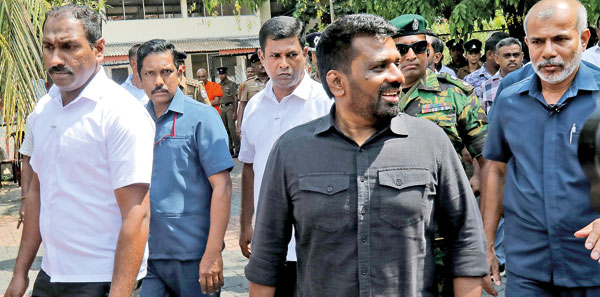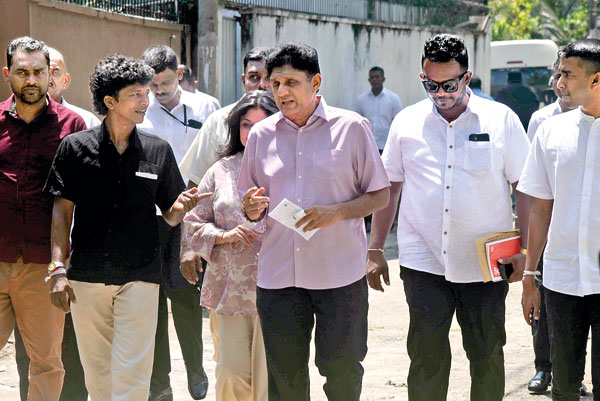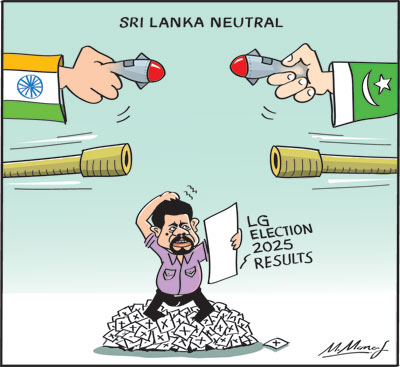Columns
- Though the ruling NPP won a majority of councils, a steep decline is seen in its rural strongholds
- Failure to bring the corrupt to justice and reveal the masterminds of the Easter Sunday attacks is cited as a main reason for the decline in support
- In the north-east, ITAK and Tamil parties regain support
- In the south, opposition parties make gains, but questions remain over SJB’s failure to significantly increase its support
By Our Political Editor
Tuesday’s local council elections delivered a brutal reckoning for the National People’s Power–Janatha Vimukthi Peramuna government, as the public’s simmering frustration boiled over into the ballot box.
Six months on, President Anura Kumara Dissanayake’s administration has suffered a staggering drop in support—one that can no longer be dismissed as midterm jitters. With just 4,503,930, or 43%, of the votes cast at the local council elections, the number speaks for itself: a steeper 2.3 million vote nosedive (18.56 %) from parliamentary polls. This is not just a wake-up call for a government in office for six months. It is an alarm blaring across the corridors of power.
The electoral map now lays bare a stark urban-rural divide. While city voters have largely stuck with the government, rural communities have issued a decisive rebuke, shifting their allegiance away from the ruling party. This shift is particularly striking given that the rural constituency had previously voted in large numbers to ensconce them in power at the two previous national elections. The extent of the disaffection is evident in the steep decline in votes from areas perceived to be the ruling party’s strong base, underscoring the electorate’s desire for change.

No sooner had he arrived from Vietnam on Tuesday than President Anura Kumara Dissanayake went to the Panchikawatte polling booth to cast his vote in the local council elections
However, JVP General Secretary Tilvin Silva argued at a news conference on Thursday that the local council election results clearly show that people believed in their government. He ruled out any tie-up with other political parties to gain a majority in some councils. Such an act, he pointed out, would be conducted only with those elected as independents. Easily the second most powerful figure in the ruling party, Silva said—from his party’s headquarters in Pelawatte, Battaramulla—that the local election results were no cause for concern.
The NPP was placed first in 265 local councils—23 municipal councils, 25 urban councils and 217 Pradeshiya Sabhas—while the main opposition SJB were placed first in 14 councils. The Federal Party, or Ilankai Thamil Arasu Katchi (ITAK), recorded victories in 37 councils. The 23 other councils were shared by smaller parties and independent groups. In 120 councils, the NPP was placed first, but the opposition parties put together exceeded their numbers. The NPP’s strength in 20 other councils equalled opposition numbers.
The Colombo Municipal Council (CMC) is an example of how the power play will shape up. The NPP-JVP won 48 seats in what was once the United National Party (UNP) bastion, leaving others to win 69 seats. This was followed by SJB 29 seats, UNP 13 seats, Sri Lanka Podujana Peramuna 5 seats, Sri Lanka Muslim Congress 4 seats, Independent Group Three 3 seats, United Peace Alliance 2 seats, Sarvajaa Balaya 2, Independent Group Four 2 seats, Independent Group Five 2 seats, United Republican Front 1 seat, Independent Group One 1 seat, Independent Group Two 1 seat, Democratic National Alliance 1 seat, People’s Alliance 1 seat, National Freedom Front 1 seat and National People’s Party 1 seat.

Opposition and Samagi Jana Balawegaya Leader Sajith Premadasa accompanied by his supporters arriving at a polling booth in Rajagiriya
All parties, excluding the NPP, improved their voter base compared to the parliamentary elections last year. In a significant move, the NPP in some of the councils located in the suburbs of Colombo obtained over 50 percent of the vote. They included the Kaduwela Municipal Council (53.4 percent), Maharagama Urban Council (52.4 percent), Kesbewa Urban Council (56.1 percent), Boralesgamuwa Urban Council (53.4 percent), Homagama Pradeshiya Sabha (55.8 percent). In contrast, the NPP’s popularity dropped in some of the remote areas. They included areas like Laggala Pallegama in Matale, where the NPP polled 36.1 percent and other areas like Ukuwela Pradeshiya Sabha (39.3 percent), Rajgama Pradeshiya Sabha in Galle (37 percent), Weligepola Pradeshiya Sabha (38.5 per cent ), Ayagama Pradeshiya Sabha (37 percent) and the Yatiyantota Pradeshiya Sabha (37.1 percent.)
This rupture in support is not just symbolic—it has tangible consequences. The NPP-JVP now finds itself precariously positioned in multiple councils, where razor-thin majorities leave the administration exposed to opposition manoeuvring. In some key councils, the opposition has overtaken the ruling party entirely, effectively rendering President Dissanayake’s government a minority in its own backyard. Unlike rival politicians who played a more conventional campaign game, the President himself spearheaded efforts on the ground—leading from the front, just as he did during the presidential and parliamentary races.
The latest local council elections underscore a politically volatile landscape in Sri Lanka. While the opposition registered marginal gains, its overall effectiveness remains questionable. The SJB managed only a 4.03% increase in votes—far below the 17.66% surge it experienced in the last parliamentary elections. This adds to the leadership struggle of Sajith Premadasa. In a bid to reassert himself, he made a public appeal that was an unusual move—urging for the opposition to get together. This appeal was a significant departure from his usual political strategy and underscored the desperate situation. The call for unity resonated with many, but whether it will translate into tangible support remains to be seen, moreso when his SJB and the UNP were not successful in their talks to reunite. The local council election results showed that if they had got together, they would have held sway in many councils. There was a bottom line—who would be the leader—and the talks collapsed.
The Sri Lanka Podujana Peramuna (SLPP) demonstrated a surprising resurgence, securing 9.17% of the vote compared to its 3.14% in the last parliamentary election. A hard-nosed campaign by Namal Rajapaksa had paid off. Though the reflection was a regional phenomenon, it is still noteworthy. Even the embattled UNP managed to claw back a modest share, rising to 4.69% from its previously negligible 0.69%. Notably, this uptick occurred despite the absence of a high-profile UNP campaign, suggesting localised support for individual candidates rather than a broader party-wide endorsement. Its leader, Ranil Wickremesinghe, who stands accused for the current sorry state of his party, lamented after the results were declared that his advice for opposition parties to get together was not heeded. He left for India on Thursday, the fourth since he quit as President.

North-East
One of the most significant shifts was the NPP-JVP’s unexpected electoral losses in local councils across the north and east—a development that stands in stark contrast to its broader national momentum. In a notable reversal, the Federal Party or the Ilankai Thamil Arasu Katchi (ITAK), secured a meaningful comeback, underscoring shifting allegiances in Tamil-majority regions. It is true that the government engaged in considerable infrastructure development work in the north and returned land held by the military to private owners. Yet, there has been no reference from NPP-JVP leaders to the 13th Amendment to the Constitution. There is also another aspect which government leaders may not be aware of. There were Tamil songs which their backers played in the north during the election campaign. They made heroic reference to Tiger guerrilla leaders and praised them. More on voting in the later paragraphs.
Despite the outward confidence projected by the NPP-JVP leadership, internal deliberations paint a different picture. One particularly contentious issue has been a circulating note identifying five non-politicians occupying key positions as primary contributors to the administration’s declining popularity.
While not all on the list to bear direct responsibility, some have been embroiled in controversies that have undermined governance and public trust. A few of the areas where the government turned unpopular overnight are analysed below. They no doubt contributed to the unpopularity of the government, both for the non-deliverance of repeated election pledges to bring those engaged in big-time bribery and corruption to book. A rapid loss of support has been linked to the government’s failure to deliver on its central campaign promise—prosecuting those involved in large-scale bribery and corruption. Six months into its tenure, little progress has been made aside from a handful of cases initiated before the current administration took office.
This has turned the searchlight on two senior police officers, widely publicised by NPP-JVP leaders as those who will deliver. They are Ravi Seneviratne, the former Senior DIG in charge of the CID. He is now secretary to the Ministry of Public Security. The other is Shani Abeysekera, the former Director of the CID. After returning from retirement, he has been reinstated to the Police in two different official capacities. He is Director of the newly established Central Criminal Intelligence Analysis Bureau. The other is Director of the Central Crime Investigation Bureau. The two were tasked with producing results on several important investigations. An example is the probe under their charge into the 2019 Easter Sunday massacres. As their probe was ongoing last month, President Dissanayake announced that by April 21, the sixth anniversary, some big names would be officially announced. However, there was no such announcement. Instead, the Presidential Secretariat announced that the final report of the Janak de Silva Commission of Inquiry that probed the massacres would be examined by a Police team.
This is four years after the same final report was sent by a previous government to the Attorney General who had initiated action on some of the alleged perpetrators. That their inability to produce results did embarrass President Dissanayake and his government. It has been the same with other cases over which President Dissanayake made references during speeches at election rallies. Other than previous cases involving the Mahinda Rajapaksa progeny, there have been no new cases.
Since assuming power, President Anura Kumara Dissanayake has pursued a strategy that extends beyond conducting local council elections—his administration is now laying groundwork for the long-overdue Provincial Council polls. Dissolved in September 2018, these councils remain without elected representatives, deepening concerns about governance stagnation under the NPP-JVP government. Alongside electoral preparations, the administration is also expanding its intelligence-gathering apparatus, moving beyond existing frameworks to establish a broader network that signals heightened state oversight of key sectors, including defence. This initiative is positioned as a means of strengthening governance and national security, though concerns linger over its implications for civil liberties and political opposition.
The months ahead of the local council elections has seen hectic activity by President Dissanayake. His government hurried through Parliament the legislation that were necessary for the conduct of local council elections, overdue for over five years. Originally they were to be held in 2022. The Minister responsible for local government extended the stalemate by postponing the polls until 2023. He was legally permitted to do so by a year. The polls were then put off by then President Ranil Wickremesinghe on the grounds that funds were not available.
President Dissanayake raised the Pay-As-You-Earn (PAYE) tax threshold that stood at Rs 100,000 to Rs 150,000. Salaries of state sector employees and the resultant pension benefits were raised to be effective from April this year. There was a delay in raising electricity tariffs, a demand from the International Monetary Fund (IMF). More lately came the exposition of Lord Buddha’s tooth relics that drew unprecedented crowds to Kandy. With a resultant high-pitched propaganda drive, the mass turnout was considered potential votes. Adding momentum was the largely attended May Day rally, an event held with the focus on local council elections.
Here, it is relevant to mention that President Dissanayake’s Clean Sri Lanka drive countrywide suffered a setback. Nearly a hundred buses with participants for the May Day rally travelling to Colombo stopped their vehicles in a row. Parking in the Southern Expressway is prohibited, and the police moved around helplessly. Most used the area as open-air toilets. Others ate their lunch brought in packets. There were yet others, at least in two separate locations, consuming local liquor. That members of the ruling party paid scant respect for Clean Sri Lanka was clear.
Dissanayake also adopted a firm stance on former presidents retaining official residences, a matter that has sparked debate. Tilvin Silva, a key figure in the NPP-JVP government, publicly urged the former president Mahinda Rajapaksa to vacate his official bungalow at Wijerama Mawatha in Colombo. It came just when President Dissanayake also urged him to quit, saying that the rental for the buildings he occupied, according to the Government Valuer, was Rs 4.6 million. This was when he was officially entitled to a rent of Rs 30,000 only. The campaign died in no time. As revealed last week, former President Rajapaksa has defiantly stayed put.
In a bid to win votes in the once troubled north, the government returned the jewellery which troops had seized during military operations. They had been identified through pawn ticket receipts and other documentation that were available with the gold and jewellery in packs. This is the third time such a return has taken place. The first took place in Vavuniya and thereafter at a ceremony at the Temple Trees. For these two occasions, the Defence Ministry then sought the help of District Secretaries to identify the owners. The Liberation Tigers of Tamil Eelam (LTTE), who dominated ground in the north, had set up banks and operated a pawning service.
There has also been discontent among farmers in the rural areas about the sale of paddy they had grown. The government’s inability to purchase their production forced them to sell their stocks to private traders at much lower prices. This remained a major issue.
Rising crime rate
Another deeply worrying factor is the rapid growth of crime. Not a day passes without a shooting incident, and the Police have still not been able to recover a substantial number of weapons, particularly automatic rifles and pistols in circulation. The NPP-JVP leadership is perhaps unaware that the sad situation in the police has contributed in no small measure to their unpopularity. Even officers in charge of Police stations around Colombo have not been able to counter even minor crime activity in their areas. The inefficiency of the Police has been reflected in two major instances. One was their inability to find their own Inspector General of Police, against whom there was a warrant for his arrest. The other is their inability to find a woman who was posing as a lawyer when a gunman shot dead an underworld kingpin, Ganemulla Sanjeeva, inside the Magistrate’s Court in Hulftsdorp. There is still a Rs 1.5 million reward for anyone who can tell the whereabouts of the woman identified as Ishara Sewwandi.
Despite a variety of issues that made the government unpopular, there is one that stands out particularly good. That is the nonuse of any state resources by them during the election. This is unprecedented.
Now to the outcome of the local councils in the north and the east: In the Jaffna district, where the NPP received 24.8 percent in the last parliamentary elections, this time it was able to gain only 19.5 percent of the vote. The votes the NPP received in the Jaffna district at the parliamentary elections were higher than what the ITAK received—19.47 percent. The ITAK votes in the Jaffna district increased to 31 percent at the May 6 local council elections. In an analogous manner, other Tamil parties too increased their voter base. In several electorates the ITAK and other parties too increased their voter base, while the NPP showed a decline, though it was comparatively lower than decreases in other districts.
ITAK General Secretary Sumanthiran told the Sunday Times, “The failure of the NPP’s parliamentarians to keep to their promises has been one of the reasons for their setback. They also failed to address the poaching issues in the Palk Strait by non-Sri Lankan fishermen and thereby broke the promises given to local fisherfolk. This was seen as another reason for the decline.”
He added, “The false promises given during the parliamentary elections by the NPP to the people in the north and east and the failure to implement some of the programmes promised are the main reasons for the voters to return to the ITAK and other Tamil political parties. One of the significant points is that the NPP has lost its popularity just six months after a parliamentary election where they got over 60 percent of the vote. In contrast, the Yahapalana government carried out a 100-day programme, but made the mistake of conducting the local government elections three years later.”
But this time, direct engagement was not enough to stem the tide of discontent.
In an election where nearly half of the registered voters did not turn up at polling booths, the remaining segment consisted of both those who voted for President Dissanayake and his government in the presidential and parliamentary elections, as well as those who chose not to cast their votes.
The government must now confront the hard truth: the electorate has sent a warning. The real question is, will they heed it? This shift is particularly striking given that the rural constituency had previously voted in large numbers to ensconce them in power at the two previous elections. The extent of the disaffection is evident in the steep decline in votes from areas perceived to be their strong base, underscoring the electorate’s desire for change.
Buying or selling electronics has never been easier with the help of Hitad.lk! We, at Hitad.lk, hear your needs and endeavour to provide you with the perfect listings of electronics; because we have listings for nearly anything! Search for your favourite electronic items for sale on Hitad.lk today!


Local Council polls: Will the Govt. heed the warning in the voters’ verdict?
View(s):